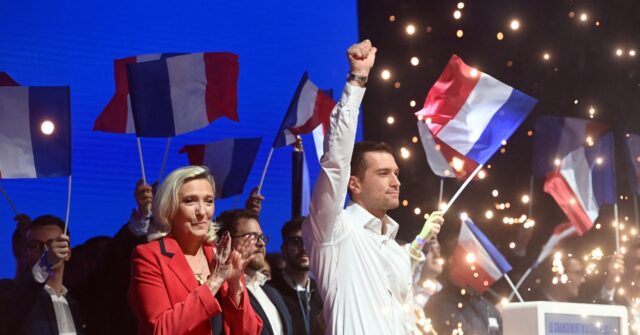Marine Le Pen and her National Rally deputy Jordan Bardella have “firmly established dominance” over the field of prospective candidates to replace French President Emmanuel Macron, according to the latest survey from Ifop.
While uncertainty reigns over the next presidential election in France, with it being unclear if President Macron will last till the end of his second and final term, and whether the current frontrunner, Marine Le Pen, will legally be permitted to run or not, it does appear to be clear that the populist National Rally party has a clear edge over Macron’s neo-liberal faction and those on the left.
A survey of voters by the French Institute of Public Opinion (Ifop), which analysed six different likely fields of candidates, found that in all scenarios, three-time candidate Le Pen or her 30-year-old deputy Jordan Bardella are the clear frontrunners, with between 33 and 35 per cent of the vote. This would provide a lead of between 17 and 20 points over their next closest competitors, according to Le Figaro.
Ifop said that the results highlighted “a reconfiguration of electoral power dynamics, with a clear weakening of figures from the central bloc and a now firmly established dominance of the National Rally.”
Although Le Pen is the clear choice of the National Rally for the election, the survey was forced to include results for Bardella as well, given that he has become the party’s “Plan B”, after Le Pen was banned from standing for any office in March by a Paris court over alleged misappropriation of EU funds.
While an appeal is likely to be held before the 2027 presidential election, it is unclear whether she will be able to overturn the “political death sentence” or if she will be forced to support her deputy instead. Stunningly, the party may actually fare better with the 30-year-old Bardella at the top of the ticket, with the Ifop survey finding that he polls one to two points above Le Pen in various matchups.
Despite his youth, Bardella has already demonstrated political success, having led the National Rally to a convincing victory in last year’s European Parliament elections, forcing President Macron to call for snap domestic legislative elections in an attempt to regain political legitimacy.
The move proved to be a disastrous mistake. With the RN threatening to take control of the National Assembly, Macron sided with the far-left in the second round of voting in a cynical election pact. It resulted in a three-way split in the parliament which has left France essentially ungovernable since, with two prime ministers resigning over the ten months after failing to be able to pass a budget through the Assembly.
France’s two round voting system, installed in the wake of the Second World War to keep what were thought of as fringe parties from taking power, has effectively prevented the National Rally from ascending to the Élysée Palace. However, with Macron unable to run again due to presidential term limits, it remains to be seen if a candidate can emerge to unite the neo-liberal left and right centrist vote while also being able to pick up enough votes from the far-left to win a second round vote against Le Pen or Bardella.
One of the leading contenders is former Prime Minister Édouard Philippe, a centre-right alopecia-stricken politico known internationally as the main force behind the hardline police crackdown against the populist Yellow Vest movement in 2018 and as the lockdown architect in France during the Chinese coronavirus crisis. Philippe, who is polling at around 16 per cent, would represent the clearest ‘continuity Macron’ candidate of the lot, favouring pro-corporate fiscal policies and close ties with Brussels.
On the other hand is Raphaël Glucksmann, the likely lead candidate for the Socialist Party, and apparent favourite of the left-liberal media in Paris, one of whom, France 2 television broadcaster Léa Salamé, happens to be his wife. While Glucksmann has distanced himself from the far-left La France Insoumise (LFI) party of radical Jean-Luc Mélenchon over alleged antisemtism, it is unclear if it will be enough to make him palatable to centrist Macron voters.
Indeed, despite pitching himself as being of the moderate left, Glucksmann has openly backed wealth taxes proposed by Thomas Piketty acolyte, economist Gabriel Zucman, to deal with France’s debt crisis, potentially making his candidacy off limits for pro-business voters. Nevertheless, he appears to be the current consensus candidate to rally around for the establishment, with top officials of the Socialist Party and prominent state media “journalists” recently being exposed discussing strategies to promote Glucksmann to centrist voters on French public airwaves.
Follow Kurt Zindulka on X: Follow @KurtZindulka or e-mail to: kzindulka@breitbart.com
Read the full article here


